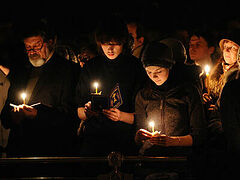When you enter the monastic quarters, you’re like a rock with sharp, jagged edges, but in the monastery, the jagged edge begin to wear away. When someone reproaches you, if you don’t get angry, it means the edges have worn down a little more. As long as you’re overcome by anger, your edges haven’t worn away yet, and reclusion won’t bring any results. A monk then comes to great spiritual peace when the jagged edges are worn off; then you don’t worry anymore and you don’t desire this age; you seek the other. But it’s gradual, gradual…
The biggest winners are those who fulfill their obedience for God and obey everyone in the brotherhood. You have to be kind to everyone, because then you’ll have peace with everyone. Don’t make distinctions.
If something is broken in the monastery and you reveal who broke it, that leads to enmity. The other person will feel hatred for you. If you can take this upon yourself, that’s very good. It will be a bit difficult, but he who takes this on himself has great peace. He comes to great peace. If you can’t take it upon yourself, at least don’t put it upon the shoulders of the other. It’s very important to want everyone to be saved.
When you condemn, the Spirit leaves you
Most of all, I made progress (seven years) when I reflected and said to myself: I will honor the priests as the Holy Apostles, the abbot as Christ, and everyone else as the disciples of the Holy Apostles. And I had such joy that I had the desire to kiss the soles and feet of all the monks. However, over time, I began to be overcome by condemnation and I started to cool off.
Most acquire the Holy Spirit when they come to the monastery. Then you look upon everyone as saints. You burst with joy; you don’t even want to hear about the world. But as soon as you begin to indulge in conversations with others, with the experienced ones, to condemn and slander others, the Holy Spirit immediately leaves you.
Then, if you confess and even weep, but don’t tell your spiritual father: “Father, I condemned so-and-so for this and that…,” but you say only: “I condemned,” but you don’t want to say how you condemned, the Holy Spirit leaves you forsaken.
For all those who confess precisely, with tears and repentance, with the obedience they render, the Holy Spirit again comes to help. Repentance is necessary to acquire the Holy Spirit again.
The Holy Spirit is so good and merciful! He is most good. But repentance is necessary. It’s only through repentance that He comes back again.
The Holy Spirit doesn’t come immediately, but gradually, gradually, to the extent that we run to the good God: “Lord, don’t leave me…” And when we pray like this, the Holy Spirit reveals Himself to us gradually, gradually.
When the devil attacked me and I prayed, I felt His help again, how He expels the devil. And in many instances, you feel how the Holy Spirit helps you. But when we meet with some brothers, we can very easily fall. All I have to do is start condemning or grumbling and that’s it—I’ve lost. It’s like on a ladder: We go up, we go up, and we fall again. And if death finds me rising, that’s the greatest joy, but if it finds me falling, woe is me—I’m lost.
If I’ve tried to overcome sin, it’s a gain, but if my sins have overcome me, then I’m subject to the Judgment of God. If I’ve gotten rid of them, it’s a gain. But if my sins have overtaken me, then the devil will go with me to the Judgment, saying, “Lord, you said we can’t serve two masters…” The devil admits that you also served God, but he says: “Lord, but he also didn’t get rid of me.” Then I’ll get what I deserve.
How we see others is what God gives us
First of all, when I go to my cell, I have to bid farewell to those with whom I was working at my obedience, and whether I have something against someone or not, I should say: “Bless and forgive me, a sinner. Maybe I upset you somehow.” And they say, “May God forgive you.” And when I go to my cell, if I have nothing against anyone, this is my gain.
I thus counted the abbot in the monastery as a saint; and when I couldn’t consider him a saint, that was it—I would collapse, I would lose everything. For it’s said: The Lord grant thee according to thy heart (Ps. 19:4). If I considered them saints, then I felt the joy of the Holy Spirit. The way I feel about them is what God gives me. Those who desire salvation for everyone, God gives them what is useful. And those who wanted bad things found bad things.
Repentance brings peace
Some people came to me overwhelmed by temptations and difficulties, saying they felt like they’re in hell. And I asked them: “Don’t be offended, but how long’s it been since you last confessed?” It turns out they hadn’t confessed in five or six years. And I told them, “Yes, you have every right to feel like you’re in hell here.” And I sent them to Confession, and six months later they came again and said they no longer felt like they’re in hell; now they feel like they’re in Paradise.
The Holy Spirit allows a man to feel Him according to the measure that he leads a repentant life. If I feel that I have pure thoughts, that I can easily overcome temptations, and I have much humility, much repentance, much collectedness of mind, and I no longer want to hear about this age, but I want to make a good beginning, and my mind is clean, transparent, then I’m overshadowed by the Holy Spirit.
And if it happens the other way around (because the Holy Spirit departs sometimes, leaves us in abandonment), then the spirit of abomination comes, with all sorts of filth. Then be attentive and ask your conscience: “Conscience, tell me the truth: If I were to die right now, would I be saved? Does God like it?” And so the Holy Spirit will drive it out.
There are moments when we’re gripped by darkness, and there are moments when we’re gripped by light and peace. And a man feels the peace of the Holy Spirit when he begins to weep, to sigh, and can’t stop crying. Then all the devils flee, he has a healthy understanding, and he understands everything in a spiritually healthy manner. A man can receive these consolations that come through tears only if he leads a repentant life and has acquired deep humility. If I could find a lock to hang on my lips, I would find salvation.
Avenge with tears. Help with love and mercy
When despondency or despair come, then this is how you have to act. Let us say to this spirit: “Christ came for the sake of sinners, of whom I’m the first!” And to the extent that I lead a repentant life, the Holy Spirit pacifies me. But first, so we can feel the mercy of God, we must combine repentance with humility. Then I have no enmity with anyone; I don’t want to hear about anyone anymore, and if I hear about someone, I don’t want to hear anything bad. When I hear about someone’s goodness, joy, spiritual prosperity, then my soul rejoices and calms down.
And when I see that some people don’t understand the importance of peace, love, and humility, and my soul sees that everyone is looking only for revenge: “He told me, and I’ll tell him!”—then I myself become smaller and I try to get out of there by any means possible. Therefore, one Holy Father says, “Unless God and I are in my heart, I won’t be saved.”
Know that we need to be aware of one thing; one Holy Father says: “If in the fire of your anger you killed someone’s soul, that soul will be demanded from the fire of your anger.” We must beware of these temptations. These are very strong, heavy temptations that haunt and gnaw at our conscience. Sometimes it’s necessary to rebuke someone, if it corresponds to the advice of the Holy Fathers; but mostly we can help the soul in another way.
One monk, the abbot of the skete, after the service ended, caught up with me at the edge of the forest and said, “Wait a little, I have something to tell you.” And he told me about some trouble with some brothers who weren’t listening to him. And he asked me, “What should I do? How can I avenge myself with them?”
And I told him that I found in one old book, God knows where: “If you want to wreak vengeance on sinners, do so through tears.” And if you wreak vengeance with tears, the Holy Spirit will help you. To the extent that you wreak vengeance through tears, the Holy Spirit will rebuke them without you rebuking them with words. It’s very important, because God’s commandment is to do everything out of love: Teach out of love, help another out of love.
It’s no longer useful to do as some Fathers in ancient times did, subjecting other monks and nuns to great trials. In those days, people made great progress [in spiritual life]. But now, in our times, it’s like going to the front, and the soldiers fighting there are wounded, covered with all sorts of wounds. And then you begin to use more and more mercy. And if you apply mercy, then the Holy Spirit will help you, pacify you, and the word of your holiness1 will have power. Because through the merciful word of your holiness, the Holy Spirit, and not your holiness, will rebuke them.





